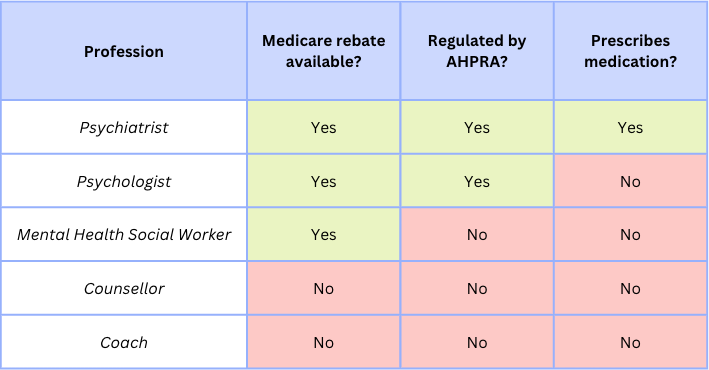Navigating mental health professionals: A simple guide
Understanding the differences between mental health professionals can be quite confusing even for people working in the field! This little guide aims to clarify the roles of counsellors, psychologists, psychiatrists, and therapists - to help you to make informed choices for your mental health journey.
Psychologist:
Psychologists study how individuals and societies function. They work in various settings like schools, hospitals, business and industry, community health and private practice.
Specialties include:
Clinical Psychology: which focuses on assessing, diagnosing, and treating mental health conditions.
Organisational Psychology: specialises in improving performance and well-being for individuals, teams, and businesses.
Other specialties include forensic psychology, sports psychology, educational and development psychology and more (read more about the different specialisations here)
Types of psychology registration include:
Provisional Psychologist: An individual currently completing an accredited postgraduate degree in psychology.
Registered / General Psychologist: A psychologist that has completed an accredited postgraduate degree.
Endorsed Psychologist: Psychologists with endorsements such as ‘clinical’ or ‘organisational’ have completed a postgraduate degree as well as a two-year supervision program to become endorsed.
Psychiatrist:
Medical doctors who assess and treat patients in mental health areas and can offer diagnoses and pharmaceutical treatments, often collaborating with a patient’s GP and/or psychologist/counsellor.
Counsellor (or Psychotherapist):
Counsellors are mental health professionals who focus on promoting well-being and solving problems. While they generally do not provide diagnoses or pharmacological treatment for mental health conditions, they are often more focused on collaborating with clients to achieve goals, much like private practice psychologists. Psychotherapists have completed relevant training to generally work with clients in the long-term and understand holistic health and well-being.
Mental Health Social Worker:
Social workers are professionals that support individuals to improve their lives, focusing on personal and social well-being. They can specialise in mental health after completing an accredited social work degree to provide counselling and other mental health services.
Coach:
They may come from a variety of backgrounds, as well as specialise in any sort of niche. Some examples are: life coaching, birth coaching, ADHD coaching, business coaching and so much more!
Here is a little snapshot on other details to help your decision making.
Other factors you could consider when choosing someone to work with:
Regulated by Australian Health Practitioner Regulation Agency (AHPRA) - this requires practitioners to meet a standard of practice, audits and monitors professionals, and manages registration, complaints and reports i.e. a formal body to protect clients’ rights when working with this practitioner
Medicare rebates are available for eligible individuals (e.g. citizens, permanent residents). Certain professions enable clients to receive a Medicare rebate to help cover the cost of a session, (e.g. $93.35 per session for 10 sessions a year) provided the client has a referral from their GP
At the end of the day, many different mental health professions refer to themselves as a ‘therapist’. This is an umbrella term that refers to someone who offers well-being services. There may be a number of factors that determine who is the best person for you - you might consider race/culture, gender, location, cost, specialisation or just vibes.
There are many fantastic lists to help you scroll and choose a therapist, and here are some lists for you:
Shapes and Sounds - Asian Australian Mental Health Practitioners List
Pola Practice - Community Directory
This list and post may be updated in future. Feel free to reach out with any questions or information to update this post.



